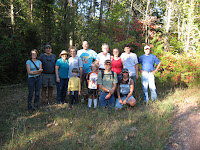
Yesterday, October 12, 2008, the Knoxville Permaculture Guild held its fourth monthly guild meeting. 14 "adults" and 2 children attended. The monthly meeting was held at Alex Pulsipher's undeveloped 70 acres in the Carter area where Alex is planning an environmentally friendly community practicing sustainable techniques. You can join Tuckahoe Sustainable Neighborhood for more discussions.
Alex had to cram in two years research in one short hour, and with questions and comments, that was no easy task. Alex focused on the challenges he has faced with Knox County codes and development policies. It is good that codes and laws exist so developers have guidelines to follow, but in the case of building a community on sustainable principles, which in turn help keep more of the land in tact, the task becomes quite challenging.
Alex has plans for a community of 25 to 50 households clustered on as small tracts as possible to minimize damage to the surrounding forest. In doing this, it is developing a residential neighborhood which means that by law, a paved road and sewage must be applied. There's not much he can do to get around this. The road has to be a certain width and paved. Sewage has to be hooked up to a line or on septic. Composting toilets are not allowed, but Alex may have found a way around this matter with the system supporting both a septic and an (forgot the term he used) oven toilet in which a shut-off valve cuts off the septic and allows sole use of the oven-type technology. (Anyone who was there knows what I'm talking about...if you weren't, hopefully someone will fill in the blank in the comment section.)
He would drill a well, but homes would operate off water caught from the rooftop. Homes can be made of natural building materials. He plans on conservation covenants on the land and on each of the homeowners' plots. He is planning an assisted living facility and community center. He is also open for co-housing units. The plan is to keep as much of the acreage in tact as possible by clustering homes. We didn't get to the topic of energy/electricity.
Gene brought up the topic of true permaculture principles and Bill Mollison, the founder of the trademark term permaculture, saying that true permaculture principle wouldn't develop a 2nd or 3rd growth recovering forest. True permaculture principle would develop homes on land that has already been desecrated like a Voldemart parking lot or farmland that has been planted and/or grazed to death, so to speak.
Alex rebutted by saying a community such as the one he is planning can act as a demonstration to change perceptions on how housing developments are constructed.
Gene was curious though as to why Alex would choose 70 acres of recovering land though and not land that was less in tact. He cited the Lake Claire Cohousing in Atlanta, Georgia as a successful example.
Alex said that where the units were planned to be placed was an area that had been over grazed/gardened/tilled, but the reason that Alex choose that site was because the land feels good.
After an hour, the group started fidgeting, and we all took a hike on the land. We walked down to the creek, well some of the group did, while some of us relaxed under a hickory tree that pelted us with nuts. The highlight of the journey was visiting the Faeries and Keepers of the wood. Gene led the group in a guided meditation and taught us how to meet the Keepers. We sat in Nature's wood surrounded by her sounds with no human noise...even our 4 and 5 year old boys sat in utter silence looking for the Faeries for an indistinguishable amount of time.
Thanks for having us out, Alex.
*Update*
This is more information written by Alex in the comments section of Rachel and Gordon's page:
"The land is 70 acres.
I'll put up a summary of the project on my page in the near future, or maybe as a discussion or group here.We are looking for between 25-35 households, most of whom would live in clusters, leaving roughly 40-50 acres of the property as communal land. Most of it is hilly woods, but there are 3 flat bottoms that have been farmed in the past.
We're thinking about possibly doing some co-housing on it, but not everyone would have to do that.
Also thinking about combining senior care/assisted living, and child-daycare with a community center."
No comments:
Post a Comment